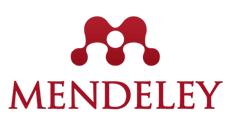PENGARUH KOMPETENSI TERHADAP KINERJA TIM
Abstract
Full Text:
PDFReferences
all, M. s. e. (2012). "skill comptence and gender." IES.
Bubshait & Farooq, 2003. Team Building and Project Success, Cost Engineering, Vol 41/No 7 July 2003, 34 – 38.
Cristina Torrelles Nada .2007.Assessingteamwork competence, Psicothema 2015, Vol. 27, No. 4, 354-361
Chong. 2007. Role Balance and Team Development: A Study of Team Role Characteristics Underlying High and Low Performing Teams. Institute of Behavioral and Applied Management. pp 202-217.
Chiung-Ju Liang,2013. Effect of core competence on organizational performance in an airport shopping center, Journal of Air Transport Management 31 (2013) 23e26
Cruz, N. M., Perez, V. M., & Ramos, Y. F. (2007). Transactive memory processes that lead to better team results. Team Performance Management, 13, 192–205.
Evans,JamesR.,1994BerfikirKreatifdalamPengambilanKeputusandanManajemen.Jakarta : Bumi Aksara.
EugeneSadler-Smith.,YveHampson.,IanChaston.,BerylBadger,2003,Managerialbehavior, entrepreneurialstyle,andsmallfirmperformance.JournalofSmallBusiness Management;Vol.41,No. 1,pg. 47-67.
Fillis,Ian.,AndrewMcAuley,2000,Modelingandmeasuringcreativityattheinterface.JournalofMarketing Theoryand Practice, Vol.8, No. 2,pg. 8-17.
Gardner, H., Gino, F., & Staats, B., 2011. Dynamically integrating knowledge in teams: transforming resources into performance. Acad.Manag. J. 2010 (0604).
Karimi, J., Somers, T.M., & Bhattacherjee, A., 2007. The role of information systems resources in ERP capability building and business process
outcomes. J. Manag. Inf. Syst. 24, 221–260.
Lester, S. (2014). "Professional standards, competence and capability." Higher Education, Skills and Work-Based Learning4(1): 31-43.
Leggat, S.G. .2007. Effective healthcare teams require effective team members: defi ning teamwork competencies. BMC Health Services Research, 7, 7-17.
Liang, D. W., Moreland, R. L., & Argote, L. (1995). Group versus individual training and group performance: The mediating role of transactive memory. Personality and Social Psychology Bulletin, 21, 384–393.
Mathieu, J. E., & Schulze, W. (2006). The influence of team knowledge and formal plans on episodic team process–performance relationships. Academy of
Management Journal, 49, 605–619.
Moreland, R. L., & Myaskovsky, L. (2000). Exploring the performance benefits of group training: Transactive memory or improved communication? Organizational Behavior & Human Decision Processes, 82, 117–133
Nurick, A J., Thamhain, H J., Cleland D., Gareis, R., 1999. Strategic Project Management, McGraw-Hill International Editions, Chapter 19.
Prog, L. D. (2012). "Defining the Core Competencies." University of California, Berkeley.
Robbins, P. Stephen, 2003. Perilaku Organisasi: Konsep, Kontroversi, dan Aplikasi. Alih Bahasa Handayana Pujaatmika. Edisi Bahasa Indonesia. Jakarta: Prenhalindo.
R. Nikolov, E. S., E. Kovatcheva (2015). "COMPETENCE BASED FRAMEWORK FOR CURRICULUM DEVELOPMENT." PICTET: EQF-based professional ICT training.
Schermerhorn Jr John R. 2005. Management. Eight Edition. John Wiley & Sons
Senior B, Swailes S. 2004. The Dimension of Management Team Performance: A RepertoryGrid Study. International Journal of Productivity and Performance Management; 53: 317 – 333.
Sisaye. 2005. Management Control Systems and Organizational Development – New Directions for Managing Work Teams. Leadership and Organization Development Journal; 26: 51 – 61.
Stashevsky, Koslowsky. 2006. Leadership Team Cohesiveness and Team Performance. International Journal of Manpower; 27(1):.63 – 74.
Simmamora, Henry, (2004). Manajemen Sumber Daya Manusia. YKPN Yogyakarta
Stump, K. N., et al. (2010). "Theories of Social Competence from the Top-Down to the Bottom-Up: A Case for Considering Foundational Human Needs." 23-37.
Szczepańska-Woszczyna, K. (2014). "Competencies, innovation and entrepreneurshipnin the theory and practice of management." Dąbrowa Górnicza 2014.
Torrelles, C. (2011). Eina d’avaluació de la competència de treball en equip [Teamwork competence assessment tool]. Tesis doctoral, Facultat de Ciències de l’Educació, Universitat de Lleida, Lleida, España.
Torrelles, C., Coiduras, J., Isus, S., Carrera, X., Paris, G., & Cela, J. M. (2011). Competencia de trabajo en equipo: defi nición y categorización [Teamwork competence: conception and categorization]. Profesorado. Revista de currículum y formación del profesorado, 15(3) 329-344.
Teece, D.J., Pisano, G., & Shuen, A., 1997. Dynamic capabilities and strategic management. Strateg. Manag. J. 8, 509–553
Trisnaningsih, Sri, 2001 “Pengaruh Komitmen terhadap Kepuasan Auditor :Motivasi sebagai Variabel Intervening(Studi Empiris pada Kantor Akuntan Publik di Jawa Tengah)” Jurnal Riset Akuntansi Indonesia, Volume 6., No 2., Mei 2003 ., Jakarta: Ikatan Akuntan Indonesia Kompartemen Akuntan Pendidikan
University, E. (2014). "Competency Definitions, Example Behaviors & Rating Scales For Performance Management Emory University." Emory University.
Weiss, E. S. B. a. M. R. (2011). "A Theory of Instruction for Developing Competence, Self-Confidence and Persistence in Physical Education." University of Oregon.
Refbacks
- There are currently no refbacks.
_______________________________________________________________________________________________
Journal of Management Review indexed by:
_______________________________________________________________________________________________
_______________________________________________________________________________________________








